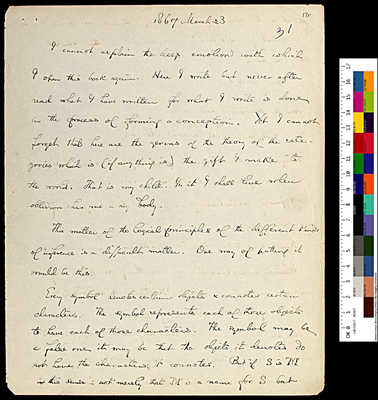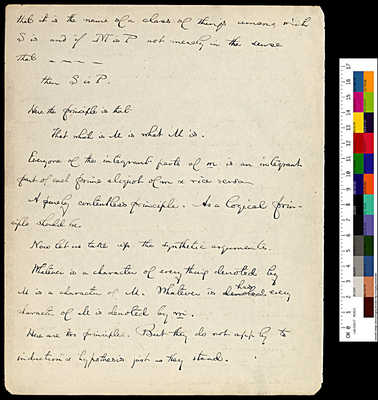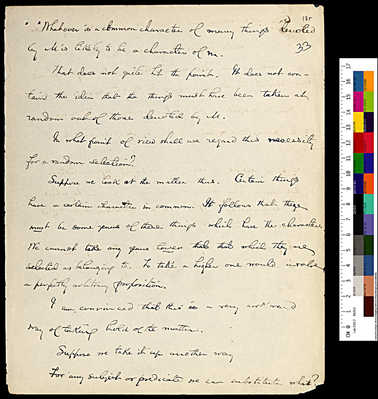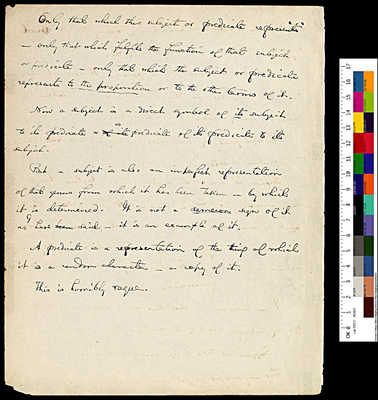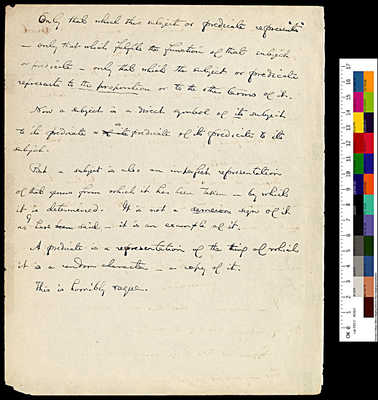Pages
0
1867 March 23 17r 31
I cannot explain the deep emotion with which I open this book again. Here I write but never after read what I have written for what I write is done in the process of forming a conception. Yet I cannot forget that here are the germs of the theory of the cate gories which is (if anything is) the gift I make to the world. That is my child. [Thru ?] it I shall live when oblivion has me -- my body.
1
that it is the name of a class of things among which S is and if M is P not merely in the lense that _ _ _ _
then S is P.
Here the principle is that That which is U is what U is.
Everyone of the integrant parts of m is an integrant part of each prime alignot of m x vice sensor
A purely contentless principle. So a logical principle should be.
Now let us take up the synthetic arguments. Whatever is a character of every thing denoted by U is a character of U. Whatever is has every character of U is denoted by m.
Here are two principles. But they do not apply to induction's hypothesis just as they stand.
2
18r
33
Whatever is a common character of many things devoted by M is likely to be a character of m.
That does not quite [fit ??] the [ferish ??] It does not contain the idea that the things must have been taken at random out of those devoted by M.
In what [point ??] of view shall we regard this necessity for a random selection? Suppose we look at the matter thus. Certain things have a certain character in common. It follows that these must be some genus of these things which have the character. We cannot take any genus lower [than ??] that which they are selected as belonging to. To take a higher one would involve a perfectly arbitrary [povfoition].
I am convinced that this is a very awkward way of taking hold of the matter.
Suppose we take it up another way for any subject or predicate we can substitute what?
3
Only that which this subject or predicate represents -- only that which fulfills the function of that subject or predicate -- only that which the subject or predicate represents to to the [proposition ??] or to the other terms of [it ??].
Now a subject is a direct symbol of its subject to its predicate [and ??] of its a predicate of its predicate to its subject.
But a subject is also an imperfect representation of that genus from which it has been taken -- by which it is determined. It is not a semion sign of it as I have been said. It is an example of it.
A predicate is a representation of the thing of which it is a random character -- a copy of it.
This is horribly vague.
4
Only that which this subject or predicate represents -- only that which fulfills the function of that subject or predicate -- only that which the subject or predicate represents to to the [proposition ??] or to the other terms of [it ??].
Now a subject is a direct symbol of its subject to its predicate [and ??] of its a predicate of its predicate to its subject.
But a subject is also an imperfect representation of that genus from which it has been taken -- by which it is determined. It is not a semion sign of it as I have been said. It is an example of it.
A predicate is a representation of the thing of which it is a random character -- a copy of it.
This is horribly vague.
